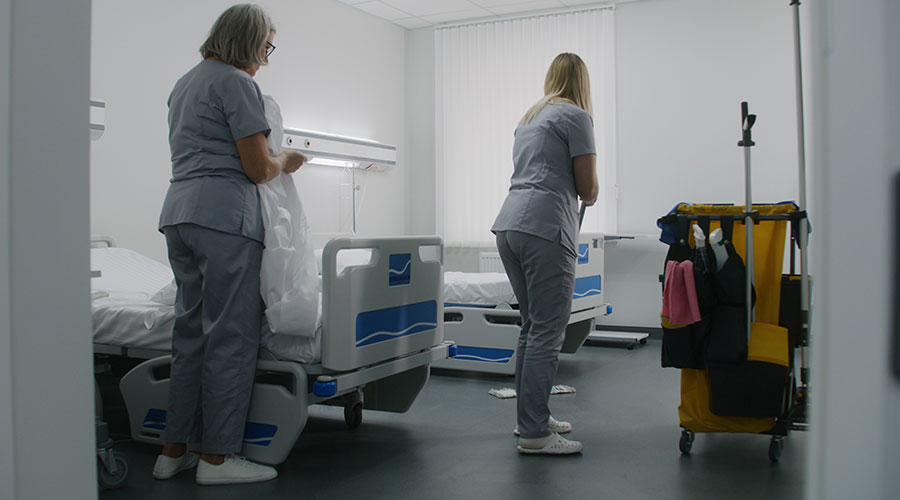Per the World Health Organization, about 15 percent of the waste generated by healthcare facilities is infectious, toxic or radioactive, making the proper disposal of medical waste one of the most important responsibilities of healthcare providers. Not only can the improper handling and disposal of medical waste expose patients, healthcare providers, the public and waste disposal workers to hazardous materials, but it can also mean serious legal consequences not limited to fines. Hazardous medical waste may be a relatively small percentage of the waste generated by a healthcare facility, but its impact if not properly disposed of can be significant. Here are some basic tips for managing medical waste safely and responsibly.
Here are five common ways healthcare facilities fail to meet the Department of Natural Resources’ requirements of infectious waste disposal:
-
Use the appropriate containers.
Using the correct containers for specific types of medical waste during handling on-site and transport for disposal is crucial, as needles and other sharps can puncture or tear through red biohazard bags. You must dispose of sharps in appropriate rigid containers before placing those containers inside biohazard bags. All containers need to be approved by the Department of Transportation (DOT) and be boxed per its restrictions on weight. All containers also should be taped shut prior to shipment, including individual biohazard bags, to prevent breakage during transport.
-
Train staff on proper waste management. (inappropriate storage)
The most common mistakes made during disposal of medical waste happen because staff either overlooks or ignores proper procedures. These procedures include:
• Placing all sharps into puncture-proof containers before disposing them
• Disposing of all waste in their proper containers and not mixing them
• Keeping all sealed medical waste containers in a dry, secure location before pickup by a qualified medical waste disposal contractor
-
Provide the appropriate documentation
All medical waste must be properly accounted for when it leaves a healthcare facility, and this means providing the proper manifest. This manifest, mandated by federal law, identifies waste and tracks it as it is transported to an appropriate off-site waste management facility. In most cases, a staff member signing a manifest for a waste pickup must have training in DOT protocols, and you need to be aware of the specific requirements in your state for hazardous waste manifests. Working with a medical waste management company can help you understand the requirements, and in some cases those companies can shoulder some of the risk for you through an agent letter.
-
Reduce medical waste (inaccurate segregation)
An effective way to get a better handle on your medical waste is to reduce how much waste your organization or facility produces. Although it is impossible to reduce certain kinds of waste, there are some small ways you can cut down on the amount of waste you have to process, such as:
• Examining surgical packs to identify unused materials
• Using washable surgical gowns and sterilization trays
• Scheduling pickups so that more waste is collected at each pickup
-
Have the right waste management partner.
Many of the most common problems in disposing of medical waste can be resolved by working with a qualified medical waste management company that understands the seriousness of the process and utilizes best practices. These companies will do whatever is necessary to ensure your organization or facility’s waste management complies with all appropriate regulations and reduces your liability risk.
Properly disposing of medical waste is a complicated but extremely necessary process for any healthcare facility or organization. Although the sheer volume of responsibilities involved can seem daunting to an organization of any size, the benefits of being diligent far outweigh any inconvenience. Key to the Hippocratic Oath is the concept of “do no harm,” of which properly dealing with medical waste is an essential component.

 Milwaukee Man Imprisoned for Stabbing Hospital Security Guard
Milwaukee Man Imprisoned for Stabbing Hospital Security Guard Disinfectant Dispensers in Healthcare Facilities Often Fail to Deliver Safe Concentrations: Study
Disinfectant Dispensers in Healthcare Facilities Often Fail to Deliver Safe Concentrations: Study Duke University Health System Receives $50 Million for Proton Beam Therapy Center
Duke University Health System Receives $50 Million for Proton Beam Therapy Center UT Southwestern Experiences Data Breach Through Calendar Tool
UT Southwestern Experiences Data Breach Through Calendar Tool Protecting Patient Data: Strategies and Tactics
Protecting Patient Data: Strategies and Tactics